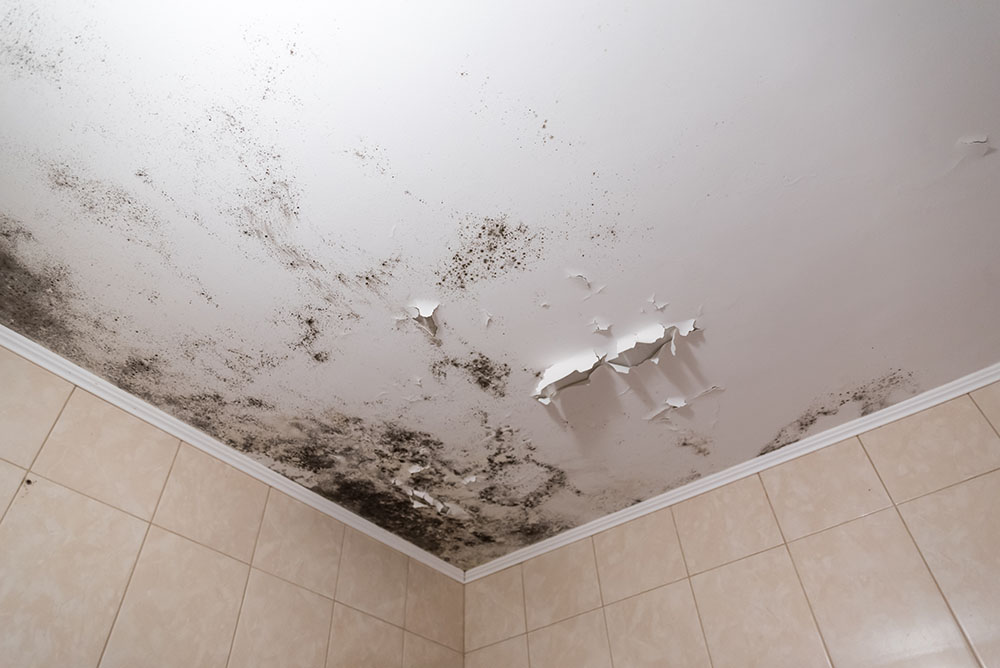What Causes Black Mould On Ceilings?
 CONTENTS
CONTENTS
- What is black mould?
- What causes black mould?
- Why does black mould grow on the ceiling?
- The health risks of black mould
- How to prevent black mould from returning
- What to do if black mould is growing in your home
- Get in touch
Although mould may be a common occurrence in some households, especially in rented properties, this does not mean it is any less harmful. Black mould can not only damage the integrity of your home and the furniture, but it might impact your health.
Here at ICE Cleaning, we offer thorough and rapid mould removal services. Our Dewpoint-accredited cleaners will diagnose the root cause of mould and carry out the appropriate treatment to prevent it from returning.
Read on to learn more about what causes black mould to grow on your ceiling and what you can do to prevent it.
What is black mould?
Black mould is a fungus known as Stachybotrys chartarum, and is usually seen inside poorly ventilated and damp properties. It could appear anywhere inside your home and has the potential to spread across the walls, ceiling, and furniture.
It is easily identifiable with its dark, black, slimy appearance and damp, earthy smell. In its early stages, it will appear more like mildew, which is dry and powder-like. Regardless of its physical state, black mould can still pose a significant risk to your health and home.
What causes black mould?
Mould grows almost anywhere in a home with high humidity levels and where significant damp is present. Black mould is more likely to appear in warm areas where surfaces get wet, like a kitchen or bathroom.
Porous materials like silicone sealants harbour black mould well, making it hard to remove without professional intervention.
Black mould can grow on walls, ceilings, carpets, and upholstery furniture. When this happens, the integrity of your home might be at risk as extensive mould growth can eventually manifest into wood rot.
Why does black mould grow on the ceiling?
If you spot mould growth on your ceiling, this could be due to a humidity issue or a leak in your roof. You can tell the difference between these causes by conducting a damp survey in your home or identifying mould stains.
Humidity-based mould is dark and slimy in appearance, forming a large cluster of black mould that spreads out. Yellow or brown circular discolouration on your ceiling indicates that your roof may be leaking, and mould is starting to grow in the damp areas.
If there is staining on your ceiling due to a leak, there could be an issue with your roof’s integrity, blocked gutters, or a burst pipe.
Black mould caused by either of these requires immediate intervention by a mould removal company. Any roof repairs must come first before tackling the mould to prevent it from returning.
The health risks of black mould
Damp and black mould attacks your immune system over time and causes many uncomfortable symptoms. Because mould spreads through the air via mould spores, you will constantly inhale these toxic substances produced by black mould. By continuing to live with mould, you may suffer from:
- Eye inflammation
- Skin rashes
- Sneezing
- Coughing
- Headaches
- Runny nose
- Increased asthma attacks
Some individuals are more vulnerable to black mould, experiencing exacerbated symptoms or developing long-term symptoms over time. Mould exposure to these groups could be dangerous:
- Children under six
- Elderly people
- Immunocompromised individuals
- People with asthma
- Individuals with skin problems
You should not stay in a property where mould is present, especially if it is in your bedroom. Sleeping in a room with mould could make you ill, so you must find temporary accommodation until the mould is removed.
How to prevent black mould from returning
The best way to stop mould from growing or returning to your property is to reduce damp. Here are some steps you should follow to do this:
- Have a damp survey conducted to help identify sources
- Ventilate your home by opening windows
- Avoid using portable heaters
- Dry your clothes outside
- Use extractor fans in the kitchen and bathroom
- Cover food when it cooks
- Keep furniture away from the walls in the winter
- Ensure wardrobes are well-ventilated
- Use a dehumidifier
- Clear pipes and gutters around the roof often
- Check for leaks in the pipework
What to do if black mould is growing in your home
If you spot signs of black mould in your home, you must not try to clean it yourself. DIY solutions like bleach mixtures are dangerous and could damage the surface and affect your health.
Attempting to scrub the mould away may only encourage it to spread mould spores which you might directly inhale.
Because mould is a fungus that seeps deeply into materials, simply wiping the surface mould away will not remove it. It eventually regrows and continues to spread, requiring professional mould remediation services to remove it.
Get in touch
At ICE Cleaning, our specialist technicians can utilise industrial-grade technology and solutions to remove all traces of mould on your property. We can provide our mould removal services nationwide, 24/7, 365 days a year, and can be on-site in a matter of hours in an emergency.
For a damp survey or mould removal, contact our helpful customer service team at 0208 066 0360 or send an email to enquiries@icecleaning.co.uk.

Speak with me today,
I’m here to help
By asking you a few questions either via phone or email I can immediately provide a realistic estimation of the cost.
You’re in good company. We’ve cleaned for the following commercial clients… View all

Why choose us?
- Cater to a wide variety of cleaning situations
- Nationwide coverage, available 24/7
- Cater to commercial and domestic clients
- Free survey provided prior to quotation
- Emergency response team
- Offer a bespoke service designed to suit all your needs
- All technicians hold professional health and safety qualifications, including BICSc, IOSH, Dewpoint Professional & Safe Contractor
We’re fully accredited
We place best practise, professional expertise and health and safety at the core of our business. We’re fully compliant with all legal obligations. You can view a list of our accreditations below, or visit our Health & Safety page for more information.











-RGB-small.1707319151.jpg)




















